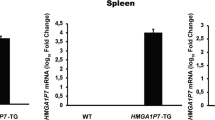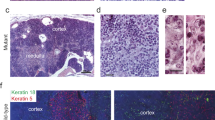Abstract
Longterm goitrogen administration to rodents is well known to result in multiple proliferative lesions of the thyroid. The regression of these lesions on withdrawal of goitrogen has led to their neoplastic nature being questioned, and they have been regarded as 'nodules' rather than as true tumours. We have induced multiple thyroid lesions by the combined use of high dose radiation as a mutagen, together with goitrogen administration to induce prolonged TSH growth stimulation. G6PD histochemistry was used in heterozygous G6PD deficient female mice to show that all the thyroid lesions induced by this regime were monophenotypic, and therefore monoclonal in origin. The great majority of induced tumours were adenomas, a minority were carcinomas. The number of carcinomas observed was significantly lower in a group of animals from which goitrogen was withdrawn for 4 weeks prior to killing, when compared to animals killed while on goitrogen treatment. Both adenomas and carcinomas, including areas of intravascular tumour, showed morphological features of regression on withdrawal of the goitrogen. There are three key cellular changes which must occur in spontaneous thyroid carcinogenesis--escape from a growth limiting mechanism, acquisition of TSH independent growth and acquisition of invasiveness. In the natural selection of mutations or epimutations during carcinogenesis, prolonged high levels of TSH are likely to remove any selective advantage from mutations that lead to TSH independent growth. Tumours induced by a regime including prolonged goitrogen treatment may therefore develop following two rather than three key stages. They will occur with an increased frequency relative to lesions observed in spontaneous carcinogenesis, but will retain TSH dependency. We speculate that several mechanisms may lead to loss of the growth limiting mechanism, including translocation of an oncogene to the region of a TSH induced promoter. Other carcinogenic regimes may also increase the yield of tumours by creating conditions which reduce the number of essential steps required for carcinogenesis, and may involve translocation to a carcinogen inducible promoter.
This is a preview of subscription content, access via your institution
Access options
Subscribe to this journal
Receive 24 print issues and online access
$259.00 per year
only $10.79 per issue
Buy this article
- Purchase on Springer Link
- Instant access to full article PDF
Prices may be subject to local taxes which are calculated during checkout
Similar content being viewed by others
Author information
Authors and Affiliations
Rights and permissions
About this article
Cite this article
Thomas, G., Williams, D. & Williams, E. Reversibility of the malignant phenotype in monoclonal tumours in the mouse. Br J Cancer 63, 213–216 (1991). https://doi.org/10.1038/bjc.1991.51
Issue Date:
DOI: https://doi.org/10.1038/bjc.1991.51



